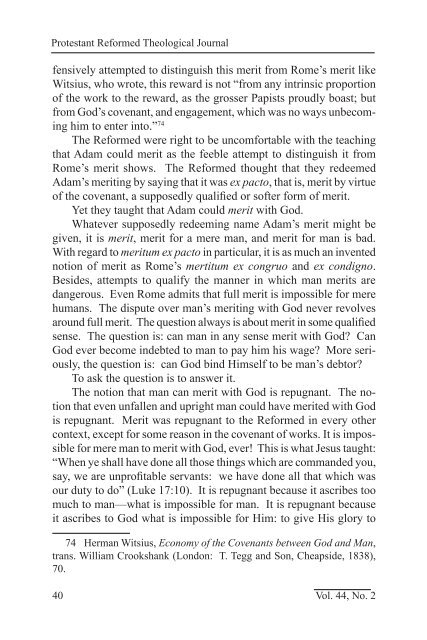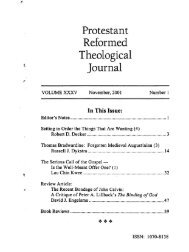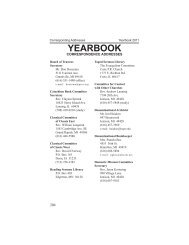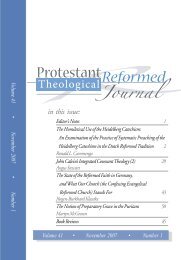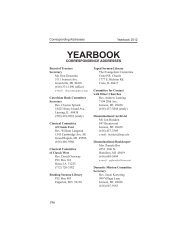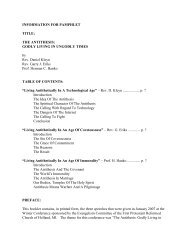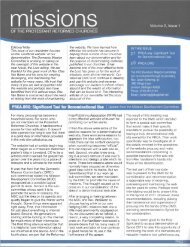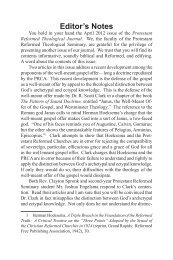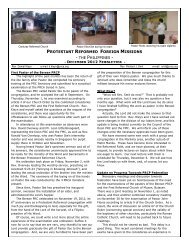A Critique of the Covenant of Works in Contemporary Controversy
A Critique of the Covenant of Works in Contemporary Controversy
A Critique of the Covenant of Works in Contemporary Controversy
Create successful ePaper yourself
Turn your PDF publications into a flip-book with our unique Google optimized e-Paper software.
Protestant Reformed Theological Journal<br />
fensively attempted to dist<strong>in</strong>guish this merit from Rome’s merit like<br />
Witsius, who wrote, this reward is not “from any <strong>in</strong>tr<strong>in</strong>sic proportion<br />
<strong>of</strong> <strong>the</strong> work to <strong>the</strong> reward, as <strong>the</strong> grosser Papists proudly boast; but<br />
from God’s covenant, and engagement, which was no ways unbecom<strong>in</strong>g<br />
him to enter <strong>in</strong>to.” 74<br />
The Reformed were right to be uncomfortable with <strong>the</strong> teach<strong>in</strong>g<br />
that Adam could merit as <strong>the</strong> feeble attempt to dist<strong>in</strong>guish it from<br />
Rome’s merit shows. The Reformed thought that <strong>the</strong>y redeemed<br />
Adam’s merit<strong>in</strong>g by say<strong>in</strong>g that it was ex pacto, that is, merit by virtue<br />
<strong>of</strong> <strong>the</strong> covenant, a supposedly qualified or s<strong>of</strong>ter form <strong>of</strong> merit.<br />
Yet <strong>the</strong>y taught that Adam could merit with God.<br />
Whatever supposedly redeem<strong>in</strong>g name Adam’s merit might be<br />
given, it is merit, merit for a mere man, and merit for man is bad.<br />
With regard to meritum ex pacto <strong>in</strong> particular, it is as much an <strong>in</strong>vented<br />
notion <strong>of</strong> merit as Rome’s mertitum ex congruo and ex condigno.<br />
Besides, attempts to qualify <strong>the</strong> manner <strong>in</strong> which man merits are<br />
dangerous. Even Rome admits that full merit is impossible for mere<br />
humans. The dispute over man’s merit<strong>in</strong>g with God never revolves<br />
around full merit. The question always is about merit <strong>in</strong> some qualified<br />
sense. The question is: can man <strong>in</strong> any sense merit with God? Can<br />
God ever become <strong>in</strong>debted to man to pay him his wage? More seriously,<br />
<strong>the</strong> question is: can God b<strong>in</strong>d Himself to be man’s debtor?<br />
To ask <strong>the</strong> question is to answer it.<br />
The notion that man can merit with God is repugnant. The notion<br />
that even unfallen and upright man could have merited with God<br />
is repugnant. Merit was repugnant to <strong>the</strong> Reformed <strong>in</strong> every o<strong>the</strong>r<br />
context, except for some reason <strong>in</strong> <strong>the</strong> covenant <strong>of</strong> works. It is impossible<br />
for mere man to merit with God, ever! This is what Jesus taught:<br />
“When ye shall have done all those th<strong>in</strong>gs which are commanded you,<br />
say, we are unpr<strong>of</strong>itable servants: we have done all that which was<br />
our duty to do” (Luke 17:10). It is repugnant because it ascribes too<br />
much to man—what is impossible for man. It is repugnant because<br />
it ascribes to God what is impossible for Him: to give His glory to<br />
74 Herman Witsius, Economy <strong>of</strong> <strong>the</strong> <strong>Covenant</strong>s between God and Man,<br />
trans. William Crookshank (London: T. Tegg and Son, Cheapside, 1838),<br />
70.<br />
40<br />
Vol. 44, No. 2


